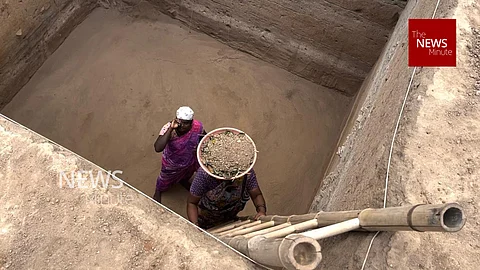

Velliamma stood under the scorching sun, inside a trench at the Keeladi excavation site in Madurai. She carefully brushed away centuries of dust from the ancient brick structures. When asked about the tiring work she has been doing for many years, she said it is a matter of pride to her — unearthing the ancient Tamil culture. The 39-year-old and about 50 other local workers at the site share the same sentiment.
The grand trenches with their towering ancient brick walls are a treat to the eyes. But what caught our attention were the group of diligent workers, scattered across the site, running around and making sure everything was intact. As we stood at the edge of a trench to take in the full view of what lay beneath, one of them offered us coffee and vadai, which tasted more like a warm welcome.
The Keeladi findings and timeline remain a bone of contention between the Union and Tamil Nadu governments. While the site has drawn global attention, and is celebrated as a symbol of a rich heritage, the hands that unearth this story — the ones covered in dust and sweat — deserve a legacy of their own.
Although archaeological work is widely perceived as simply ‘digging’ into the ground, it is actually a slow, fragile, and tedious process. Each layer of soil needs to be scraped out with extreme care to avoid damaging what lies beneath.
What is fascinating at Keeladi is how local workers from Madurai, many of whom were once engaged in agriculture, have now mastered these archeological skills. They can scrape soil, patiently sift through it, and identify ancient artefacts.
“Scraping is a crucial task, as an artefact can be found at any layer of the soil. Workers are asked to report to us if they find anything other than soil,” said Ramesh Masethung, director of the Keeladi excavations, who also trained these workers.
The work is done step by step, every 4x4 metres, and demands that workers remain alert and proactive. Officers say the workers are highly cooperative and aware of the significance of their work. “They have the sense of knowledge, now they can differentiate glass beads from stone beads,” said Ajay Kumar, an archaeological officer overseeing the excavation.
The workers, all local residents of Madurai, are appointed on a contract basis, and most of them are women. Officers said that all workers receive equal pay, ensuring fairness across the team.